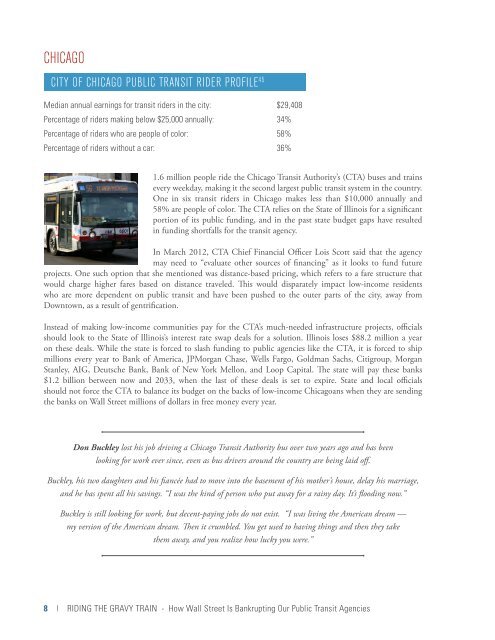Riding the Gravy Train - ReFund Transit
Riding the Gravy Train - ReFund Transit
Riding the Gravy Train - ReFund Transit
You also want an ePaper? Increase the reach of your titles
YUMPU automatically turns print PDFs into web optimized ePapers that Google loves.
CHICAGO<br />
CITY OF CHICAGO PUBLIC TRANSIT RIDER PROFILE 45<br />
Median annual earnings for transit riders in <strong>the</strong> city: $29,408<br />
Percentage of riders making below $25,000 annually: 34%<br />
Percentage of riders who are people of color: 58%<br />
Percentage of riders without a car: 36%<br />
1.6 million people ride <strong>the</strong> Chicago <strong>Transit</strong> Authority’s (CTA) buses and trains<br />
every weekday, making it <strong>the</strong> second largest public transit system in <strong>the</strong> country.<br />
One in six transit riders in Chicago makes less than $10,000 annually and<br />
58% are people of color. The CTA relies on <strong>the</strong> State of Illinois for a significant<br />
portion of its public funding, and in <strong>the</strong> past state budget gaps have resulted<br />
in funding shortfalls for <strong>the</strong> transit agency.<br />
In March 2012, CTA Chief Financial Officer Lois Scott said that <strong>the</strong> agency<br />
may need to “evaluate o<strong>the</strong>r sources of financing” as it looks to fund future<br />
projects. One such option that she mentioned was distance-based pricing, which refers to a fare structure that<br />
would charge higher fares based on distance traveled. This would disparately impact low-income residents<br />
who are more dependent on public transit and have been pushed to <strong>the</strong> outer parts of <strong>the</strong> city, away from<br />
Downtown, as a result of gentrification.<br />
Instead of making low-income communities pay for <strong>the</strong> CTA’s much-needed infrastructure projects, officials<br />
should look to <strong>the</strong> State of Illinois’s interest rate swap deals for a solution. Illinois loses $88.2 million a year<br />
on <strong>the</strong>se deals. While <strong>the</strong> state is forced to slash funding to public agencies like <strong>the</strong> CTA, it is forced to ship<br />
millions every year to Bank of America, JPMorgan Chase, Wells Fargo, Goldman Sachs, Citigroup, Morgan<br />
Stanley, AIG, Deutsche Bank, Bank of New York Mellon, and Loop Capital. The state will pay <strong>the</strong>se banks<br />
$1.2 billion between now and 2033, when <strong>the</strong> last of <strong>the</strong>se deals is set to expire. State and local officials<br />
should not force <strong>the</strong> CTA to balance its budget on <strong>the</strong> backs of low-income Chicagoans when <strong>the</strong>y are sending<br />
<strong>the</strong> banks on Wall Street millions of dollars in free money every year.<br />
Don Buckley lost his job driving a Chicago <strong>Transit</strong> Authority bus over two years ago and has been<br />
looking for work ever since, even as bus drivers around <strong>the</strong> country are being laid off.<br />
Buckley, his two daughters and his fiancée had to move into <strong>the</strong> basement of his mo<strong>the</strong>r’s house, delay his marriage,<br />
and he has spent all his savings. “I was <strong>the</strong> kind of person who put away for a rainy day. It’s flooding now.”<br />
Buckley is still looking for work, but decent-paying jobs do not exist. “I was living <strong>the</strong> American dream —<br />
my version of <strong>the</strong> American dream. Then it crumbled. You get used to having things and <strong>the</strong>n <strong>the</strong>y take<br />
<strong>the</strong>m away, and you realize how lucky you were.”<br />
8 | RIDING THE GRAVY TRAIN - How Wall Street Is Bankrupting Our Public <strong>Transit</strong> Agencies


